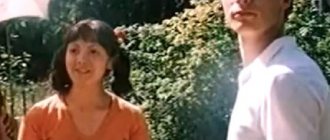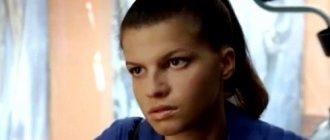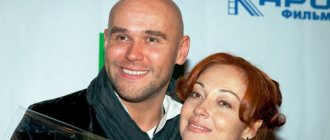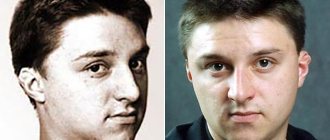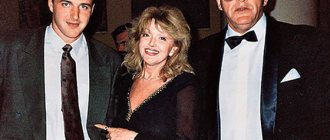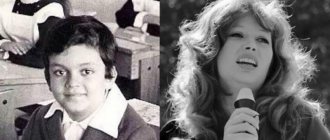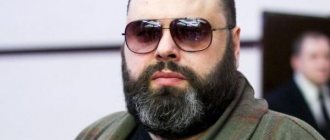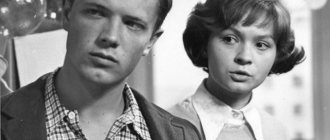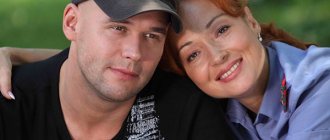Childhood
Maxim's father Isaac Dunaevsky was a famous classical composer. Mother Zoya Pashkova was a ballerina in the Moscow theater. The parents were not officially married, because the father was officially married to Zinaida Sudeikina. In this union he had a son, Evgeniy, who was Maxim’s half-brother.
Isaac Dunaevsky passed away very early, when Maxim was still in middle school. Next came the question of inheritance. With the assistance of influential figures in music, Maxim and his mother were recognized as the legal heirs. Until 1961, Maxim Dunaevsky wrote works under his mother’s maiden name, and after his father’s death he took his surname.
Maxim became interested in music in early childhood. He often sat down at the piano, came up with melodies, and improvised. But he was not very persevering, so his parents did not insist on studying. After the sudden death of Dunaevsky Sr., Maxim seriously took up music and set himself the goal of becoming a famous composer, like his father.
The Mystery of Birth
Maxim's biography was unusual from the very beginning. Maybe this left its mark on his entire subsequent life. His work also became non-standard; his personal life did not fit into the canons of Soviet morality. But first things first.
Maxim Dunaevsky is the illegitimate child of the outstanding composer Isaac Dunaevsky and one of the leading dancers of the Operetta Theater, the beautiful ballerina (20 years younger than him) Zoya Pashkova. At the time of Maxim’s birth, his father continued to be legally married and already had one child – a son, Evgeniy.
There was no question of divorce in the father's position - Soviet censorship and communist cells strictly monitored the moral character of public people. And although they turned a blind eye to many things, the official status of a social unit must be preserved. Thus, Maxim was even deprived of the privilege of bearing his father's surname.
However, in 1955, after the death of the famous parent, whom Stalin himself personally knew and respected, Zoya Pashkova filed documents with the court to recognize her son as Dunaevsky’s legal heir.
Having in her hands numerous evidence of a romantic relationship with his father, after long trips to the authorities, she achieved her goal, and the Supreme Court recognized Maxim as the legitimate son of Dunaevsky. On these grounds, when receiving the passport, the father’s surname was already entered in it.
Student years
Maxim entered the music school, graduated with high marks and continued his studies at the P.I. Conservatory. Tchaikovsky. The future talented composer studied classical music. But his acquaintance with the student theater “Our House” turned the composer’s whole life upside down. He began writing compositions for films and plays.
As a student, Maxim created classical works. His creative collection includes piano concertos, numerous romances and cantatas. A little later, the composer became interested in creating stories for the stage and cinema.
Musical pieces from “The Twelve Chairs” and “The Search for Captain Grant” are by Maxim Isaakovich. More than 60 films were released on TV screens, in which the maestro’s wonderful music sounded. The composer did not ignore television plays and cartoons; Dunaevsky wrote many compositions for them.
Unlocking talent
Both sons of Dunaevsky completely refuted the saying that nature rests on the children of geniuses. Each of them revealed their creative potential and achieved outstanding success. The eldest, Evgeniy, was a talented and famous artist. And Maxim followed in his father’s footsteps and showed musical talent from childhood.
Already at the age of 5, he went to study at a music school, and then transferred to a music school at the conservatory. Of course, having the example of his famous father before him, he also dreamed of becoming a famous composer and writing classical music and serious, large works.
In his dreams, the boy heard his creations performed by the Moscow Bolshoi Symphony Orchestra. This dream will come true, but in a slightly different way.
At the music school, the composition department was initially chosen; Dunaevsky Jr. graduated from the conservatory in the same specialty. He was incredibly lucky with his teachers. His musical mentors were such outstanding personalities as Tikhon Khrennikov, Alfred Schnittke and other composers, whose songs were known and sung by the entire vast Soviet country.
After immigration
In 1992, Maxim moved to America and lived there until 1999. Abroad, the composer continued his work, published articles and appeared on television. For Hollywood, the master wrote music for several films.
At the end of the century Dunaevsky returned to Russia
Maxim Isaakovich's songs were popular among pop performers such as Tatyana Bulanova, Mikhail Boyarsky and Masha Rasputina. The maestro wrote more than 10 songs for Nikolai Karachentsov, which were included in the album “My Little Lady”.
The songwriter does not always speak flatteringly about modern performers. In his opinion, many of them should not have gone on stage. The only young musicians he praises for their professionalism are Dima Bilan and Alexander Panayotov.
The beginning of a creative journey
And although by the time he graduated from the conservatory, Maxim had already written dozens of classical musical works, they could not compare in scale and sound power with the creations of his father. The young composer was constantly dissatisfied with himself, looking for something new, something of his own that would put him on a par with his famous parent.
To him who knocks, let it be opened. For Maxim, the door to the world of completely different music was a chance meeting with Mark Rozovsky, who staged plays on the stage of Moscow State University, being the head of the student theater. It was he who asked Dunaevsky to write music for one of his performances. The collaboration was so successful that they worked together for several more years.
With the light hand of Rozovsky, Dunaevsky Jr. tried himself in a new genre and he really liked this direction. Somehow, new proposals gradually began to appear. At first, he wrote accompaniments only for theatrical performances, and a little later, word of him spread to the directors of Soviet cinema.
Movie soundtracks and hits
Dunaevsky gained wide popularity by creating music for his favorite films:
- “Fortune Teller” from the film “Ah, Vaudeville, Vaudeville”
- "Call me, call" film "Carnival"
- "Winds of Change" from "Goodbye Mary Poppins."
The hits from the film “D'Artagnan and the Three Musketeers” were especially popular. The famous hit “It’s time, it’s time, let’s rejoice...” became a mandatory rhythmic test for music students, although the previously popular style was unacceptable for music schools.
Dunaevsky has more than 150 hits, released on records and in the “Golden Collection” collections.
At the beginning of the 21st century, the film “Border. Taiga novel." Maxim Isaakovich composed the music for the melodrama. Other films were not without works by the famous composer: “The Twelve Chairs”, “Utesov”, “The Flying Ship”. Currently, Dunaevsky is involved in the creation of new projects. This is the film “1812: The Uhlan Ballad”, in which the main roles were played by Sergei Bezrukov and Anna Chipovskaya.
Confession
Dunaevsky participated in a television program dedicated to the operetta “With a Light Genre!” He was also on the judging team of the program “People’s Artist”, and was one of the experts for the qualifying round at Eurovision. The composer took part in the creation of the annual television program “New Songs about the Main Thing.”
A separate milestone in the composer’s work was writing works for musicals. All his life Dunaevsky wanted to create the musical Scarlet Sails. And he succeeded. The performance was first shown on the stage of the RAMT Theater, the second edition was a success at the Yekaterinburg Comedy Theater. In Perm and Novosibirsk, the actors of the play received the Golden Mask awards.
A bright page in the composer’s biography was a program on one of the federal channels dedicated to the work of Dunaevsky
Seventh wife Marina Rozhdestvenskaya
In 1999, Maxim Dunaevsky met his seventh wife at one of the closed parties. She is 28 years younger than the composer and at the time of their acquaintance she already had a daughter, Maria. Marina is a choral conductor by profession, so she knew Dunaevsky’s work very well, but she had heard almost nothing about his stormy personal life.
The relationship between Maxim Isaakovich and Marina developed gradually. At the time they met, they were both looking for new relationships. A joint vacation in Snegiri brought these people very close together and after 3 months the composer proposed to his beloved. Marina admitted that she was afraid to get married because of the age difference. She had concerns that her new husband would not accept her daughter well. She had already had a similar experience in her life. But family life with Dunaevsky did not bring any unpleasant surprises. Maxim Isaakovich adopted Maria, and 3 years later their joint daughter Polina was born.
Marina Rozhdestvenskaya is a very strong and self-sufficient woman. She did not give up her favorite job after she married a successful and influential man and gave birth to his child. Maxim Isaakovich said in an interview that his wife is very persistent. At some point, she decided that she wanted to be close to him and did everything possible for this. He also noted that Marina is very similar to his mother.
The composer's seventh marriage turned out to be the longest and happiest. Marina believes that the secret lies in her willingness to compromise and endless patience. Maxim Isaakovich did not settle down even at such a respectable age. His wife more than once found his love correspondence with other women, but did not attach much importance to it. She came to terms with the fact that her beloved man does not only look at her.
Personal life
The personal life of Maxim Dunaevsky is truly surprising: the composer led each of his 7 passions down the aisle. It is known that the composer had 7 wives. And these are only official relations.
Natalia Leonova
Maxim got married for the first time while he was a student. The chosen one was Natalya Leonova, the daughter of the Secretary of the CPSU Central Committee, a wonderful actress who played in many films. Two years later the marriage broke up. The maestro himself admits that without love there can be no marriage and, if feelings have cooled down, you need to leave.
Natalya’s influential father threatened Maxim with all sorts of curses, but the most he did was get a temporary ban on traveling abroad. Unions with singer Regina Temirbulatova and Elena Dunaevskaya were also short. The composer left all his acquired property and apartments to each of his ex-wifes.
Heir
The next wife of Maxim Isaakovich was Natalya Andreichenko. The main role in the film “Mary Poppins...” brought fame to this actress. Natalya gave birth to her husband's son Dmitry. But the relationship was short-lived, and the actress left Dunaevsky. She fell in love with foreign actor Maximilian Schell and went abroad with him. Son Dmitry now lives in Switzerland and does not maintain contact with his father.
Daughter Alina
In parallel with his official relationship with Andreichenko, the composer had an affair with Nina Spada, which lasted 2 years. The woman worked as a translator from foreign languages, and also wrote books, one of which was revelations about Maxim Dunaevsky.
Nina was the muse for writing the song “Call Me, Call” from the film “Carnival”
Maxim's beloved gave birth to his daughter Alina. But Dunaevsky did not want to commit himself to official relations. After some time, Nina married a Frenchman and moved to live abroad. Daughter Alina grew up in Paris and became a famous musician. She created her own group and performed songs in French and Russian. Participated in various musical events.
The gene of a talented father and grandfather was passed on to her. Alina remade the song from the film “Carnival”, breathing new life into it. The girl took part in the creation of a documentary film on the NTV channel, which talked about the daughters of the famous composer.
Two short marriages
Romances with model Olga Danilova and singer Olga Sheronova brought the composer to the registry office, but did not last long. The reason for this was past love.
Marina Rozhdestvenskaya
The composer's seventh wife was Marina Rozhdestvenskaya. She was much younger than her husband. Dunaevsky himself told how the girl resembled his mother in appearance and character. The woman gave birth to Maxim's daughter Polina. From a previous relationship she had another child - a daughter, Maria, whom Dunaevsky subsequently adopted and gave his last name.
The couple have been happily married for 20 years. The composer's relationship has never been so long. Maxim admits that he has become more patient in relationships. Marriage is work that is not given to everyone. A stable personal life also had a positive impact on creativity. Marina became the only wife with whom Dunaevsky married.
Broken connections
Dunaevsky broke off relations with many of his children. So, he does not communicate at all with his son from Natalia Andreichenko, Dmitry, and his daughter from Nina Spada, Alina. Maxim refuses to comment on his decision. The youngest daughter Polina plunged headlong into her acting career. The eldest Maria studies at the Shchepkinsky School.
Natalia Andreichenko
Maxim Dunaevsky and Natalya Andreichenko
Maxim was always the initiator of the divorce; only his fourth wife, Natalya Andreichenko, left him on her own - to Maximilian Schell, whom she met on the set of the film “Peter the Great”. Maximilian did not know Russian, she did not speak English. On their first date, Schell drew a picture on a napkin: a man and a woman on a bridge with the moon on it. He explained with gestures:
Wherever you are, I will miss you and say hello to you across the moon...
For the sake of Andreichenko, Shell abandoned his three main rules: do not marry a woman with a child, do not marry an actress and do not marry at all.
Dunaevsky loved Natalya and tried to hide his infidelities with busty waitresses. But when Natalya directly told him that she was leaving for Shell, he did not hold her back, although they sobbed on each other’s chests all night. The divorce was nervous, for some time Natalya limited Maxim’s meetings with her son Mitya. Then the relationship between the divorced spouses improved and grew into friendship. The family said: Mitya has two dads. But he considered Maximilian his father. Dunaevsky has other children - Alina was born by Nina Spada, who had a two-year affair with the composer, and Polina is the daughter of Marina Rozhdestvenskaya.
Maxim Dunaevsky now
To this day, Maxim Isaakovich continues to create. In 2020, he wrote music for the melodrama “About Love” by Vladimir Bortko. Starring famous Russian actors. In 2020, Dunaevsky took part in the “Honest Word” program, hosted by Yuri Nikolaev. At the meeting, he spoke about his father, children and spouses. And he was also frank about the state of modern show business.
The last wife of composer Maxim Dunaevsky, with whom he is still married to this day
The famous composer has his own website, as well as an Instagram profile, where he periodically posts new information and photos from concerts and tours. In addition to creativity, Dunaevsky is involved in charity work. There is a foundation of which he is the president.
Early years, childhood and family of Maxim Dunaevsky
The future famous composer was born on January 15, 1945 in Moscow. His family was closely connected with art and was distinguished by the presence of several bright personalities.
Maxim's father, Isaac Osipovich Dunaevsky, was a famous Russian composer, whose life and work were considered an indisputable role model for many years. Zoya Ivanovna Pashkova, the mother of our today’s hero, was also a bright and original personality. The talented woman worked as a ballerina all her life, and therefore her fame was in many ways not inferior to the glory of her common-law husband.
Composer Maxim Dunaevsky in his youth As for Maxim himself, he began his creative path by studying at a music school. After this there was a period of study at the theoretical and composition department of the music school, which operated at the Moscow State Tchaikovsky Conservatory. Subsequently, here at the same educational institution, Maxim studied composition for several years. Over the years, his teachers and mentors were such renowned figures of Soviet musical art as Alfred Schnittke, Andrei Eshpai, Tikhon Khrennikov, as well as many other outstanding masters.
While studying at the Tchaikovsky Music Conservatory, our today's hero dreamed of becoming a famous composer writing academic music. In this capacity, he wrote a huge number of wonderful works, but over time he switched to another direction in his work and began writing music for theatrical productions.
In this regard, the meeting with the leaders of the student theater “Our House” Mark Rozovsky and Ilya Rutberg became decisive in his fate. Their acquaintance grew into a long collaboration. At first, Maxim Dunaevsky wrote music for performances, and later began to work with film directors.
